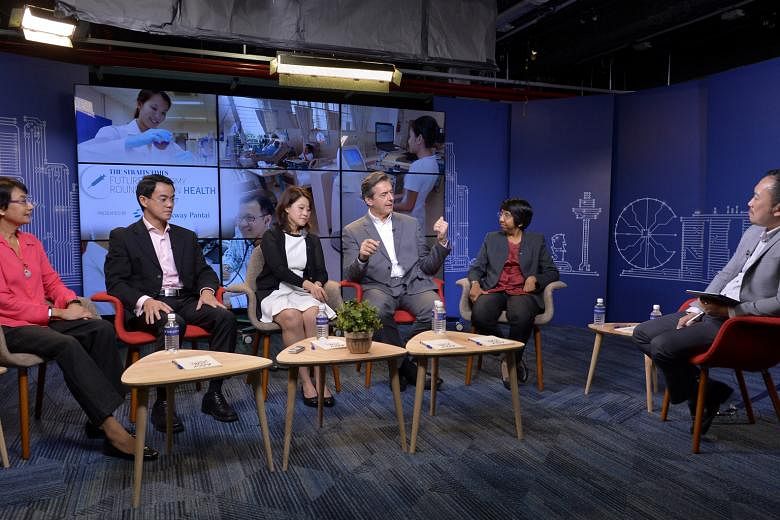Q. The cost of healthcare has become a political issue and the Government has done quite a bit in recent years, introducing MediShield Life, the Community Health Assist Scheme (Chas) and so on, to address this. Looking back at the last 20 years at how the cost of drugs, treatments and surgery has changed, and looking ahead at the next 20 years: Will the real cost of healthcare - the relative cost of falling sick compared to what you earn and the standard of living you are used to - go up, go down or remain the same?
KELVIN LOH: If you look at single episodes of care and the cost of treating a disease, it may well have gone up, and the reason is that so many diseases which could not have been treated in the past are treated well now. For example, tuberculosis. Fifty years ago, the treatment was plenty of fresh air and sunshine, but that is not the case today. You do CT scans, look for the lesion, treat it with multiple antibiotics and make sure the person gets cured. The cost of treating it clearly must be more compared to fresh air and sunshine, but we have delivered much better outcomes and people do not typically die of tuberculosis today. That said, we cannot leave healthcare cost to run its own course and we do have to manage the rate at which it increases. It's about using good management and preventive medicine to give the right care when it's needed, to connect with the patient throughout his lifespan.
JEAN-LUC BUTEL: You have now a convergence of technology, analytics, and the ability to predict diseases way ahead of time. So you're avoiding the acute care setting, which is the most expensive. The cost of care in the next 20 years will probably go down. Also, it has to go down because with the ageing of the population, we cannot afford higher costs. On average in OECD countries, 70 per cent of your lifetime spending on your health happens in the last five years of your life.
SALMA KHALIK: Currently, a lot of money is spent to extend life. Is this something we should relook and ask ourselves: Is this the way we want to go?
BUTEL: This is a very acute problem but some countries are starting to see there are different options and it's a wise thing to consider. In Europe, they don't deny treatment, but they say: "At this stage of your life, there are three other treatments that are a quarter, a tenth of the cost of what you would otherwise get."
-
PANELLISTS
-
JEAN-LUC BUTEL , global healthcare adviser, president of K8 Global
K. THANALETCHIMI, president of the Healthcare Services Employees' Union
KELVIN LOH, chief executive, Singapore Operations Division, Parkway Pantai
NGLI LIAN, co-founder and director, TetsuyuHome Care
SALMA KHALIK, senior health correspondent at The Straits Times
MODERATOR
IGNATIUS LOW, managing editor of Singapore Press Holdings' English/Malay/Tamil Media Group
K. THANALETCHIMI: Certainly these are ethical issues and individuals often have to struggle with their own conscience. You want the best for your loved ones, so a lot of times, we see people say to the doctor: "I want the best treatment for my mother, for my father."
SALMA: I can see this becoming a political problem in Singapore because with MediShield Life, we promised everybody basic healthcare. But people know that currently, there are better and more expensive treatments. Supposing I'm in my 40s or 50s and I get a cancer that can be treated with a half-a-million-dollar medication but I don't have the money, should the state pay for it? Do I have a right to that treatment?
LOH: That's an important policy and funding discussion. But Singapore is in a good position. We have used insurance very wisely and insurance is what helps take care of catastrophic situations. The beauty is that if all of the population is on a good insurance plan, then we share that risk and we will all be in a better position to afford it.
BUTEL: There's a broader issue in terms of people's choices. In the past, all the knowledge about medical care was in the head of the doctor. Now, it's in our iPhone - it's a huge transformation. Of course, the responsibility for care still lies with the surgeon, but there is a need to make our population accountable for their lifestyle choices. If I become alcoholic, why should society pay for my treatment? It was my choice... Many insurance companies in the US have started to look at your lifestyle and give you points and discounts on your premium. If the incentive becomes strong enough, people will change their behaviour.
-
If there was one area of technology that Singapore, with an ageing population, needs to invest in more, what would it be?
-
COST-CUTTING THROUGH EDUCATION
"I'd say invest in education. The first part is education in terms of developing the healthcare leaders of the future. There will be endless possibilities in terms of technologies we can adopt. But if you don't have the right leadership, people who can set the right policies as well as manage things well on the ground across the continuum, then costs will go up despite the advent of technology. The second is to invest in education for the public - general education in terms of health but also specific, targeted education that helps change behaviour."
DR KELVIN LOH
-
KEEPING A HEALTHY DISTANCE
"I would go for tele-monitoring, so I don't have to keep going to see the doctor for my hypertension, my cholesterol levels or my diabetes. The readings can be sent to a central area where someone can monitor and tell me 'okay, you need to tweak your medication a bit because the levels are going up'. I would go for this partly because of the volume - we're talking about hundreds of thousands of people here whose health can be kept better with something like that. A lot of Singaporeans have chronic problems."
MS SALMA KHALIK
-
FROM CRADLE TO GRAVE
"We really need to focus on seamless care, which includes seamless transfer of information and probably seamless treatment. In other words, when a child is born, the care must be stamped onto the child all the way until he passes on. And the only technology I can think of is to tag babies with a chip when they are born."
MS K. THANALETCHIMI
-
TOOL TO REDUCE BOTTLENECK
"I think technology is good only if it changes behaviour. If not, then you add complexity. Anything that allows you to reduce the bottleneck that you find in hospitals - not enough facilities, not enough doctors, nurses - and brings upstream the capability for testing and diagnosis, I think is a great tool to have."
MR JEAN-LUC BUTEL
-
GETTING THE HOUSE IN ORDER
"The biggest problem that we have today, in my view, is actually the healthcare ecosystem. We need an ecosystem that connects different players, and a mindset for the ecosystem to actually come together. So I don't think it is about investing in the right technology. I think it's about getting the structure right first, and then using technology to make it happen."
MS NG LI LIAN
SALMA: Actually, the US insurance companies have something else that Singapore can learn from. When you are insured with them for life, they make sure you go for screening so if they catch anything, they can treat it quickly and the cost to the insurance company is less. Should MediShield Life make basic screening compulsory for everybody at certain ages, maybe at 40, 50, 60, and then make sure people follow up?
Q. This links to the idea of genetic screening. I've seen sci-fi films where the population is screened according to their family history and likelihood of getting this or that disease. If the probability of getting diabetes is quite high, then the state demands that you have very low sugar intake and that is its way of managing healthcare costs. In 20 years' time, will we be anywhere near this kind of dystopia?
SALMA: It can be done, but I'm against it because you're going to end up with discrimination. If a kid is predisposed to cancer or diabetes, nobody is going to employ him.
BUTEL: I don't have a position on that. But if there is a place where it could be done, it's in Singapore, because the trust factor between the Government and the people is one of the highest in the world. The science of genomics and genetics are huge assets that we should find a way to utilise. If we find a way to use this data properly and reasonably with total transparency, maybe there's a way to benefit from such screening.
Q. We have an ageing population in Singapore which will put tremendous strain on the system. But now there are probably many people who are thinking about retiring in Malaysia, where the standard of living is lower. With the high-speed rail to Kuala Lumpur that will be ready in 10 years, it could well be a very viable solution. And what that means is that your primary care is going to be in Malaysia. So in a way, we could end up exporting the problem, if I may use that word.
THANA: When you look at the direction of healthcare, one often talks about "right-siting" the patient, and putting them in a home environment (in Singapore) is the best thing that anyone can do. Being with loved ones really does have this healing power.
BUTEL: The issue of social separation with the ageing population will be a huge problem in the future. People remain healthy and engaged intellectually, mentally and emotionally when they are in contact not just with other 80-year-olds, but with younger people. You cannot zone people by age.
LOH: The primary driver of whether somebody moves out of the country or not cannot be the cost of healthcare, but one's social situation, where you want to live. But healthcare remains a very local service that needs to connect with the individual where he lives. From a policy position, healthcare should be, as far as possible, delivered to an individual in the most cost-effective way wherever that person chooses to live.
SALMA: Aside from that, medicine is a lot cheaper in Malaysia than in Singapore. So your normal chronic disease medicine and so on is cheaper because pharmaceutical companies do sell drugs differently in different places. Can we just pop over to a Parkway clinic in KL and pick up our three or six months' worth of medicine?
Q. And still be subsidised by the Singapore Government?
LOH: The answer is "yes". Gleneagles Medini in Johor is open and it is accredited for Medisave use. So Singaporeans can, in fact, go there and use their Medisave.
SALMA: What we need to do is change our insurance coverage to allow people to go overseas for treatment and be covered by the same insurance company and at the same rate. The hospital will have to be accredited, but it could really lower healthcare cost as it will be cheaper for the patient and the insurer as well.
LOH: In the long term, what matters to us most is that we must deliver good healthcare and we must lower costs for the patient. If some episodes can be treated outside the country and the patient is willing to travel, that's okay. But this should not distract us from the fact that the bulk of healthcare must still be delivered locally, especially in the later years of life when there are typically more frequent visits to the doctor. We can't say: "You know what, to get better and cheaper healthcare, please go out (of Singapore)."


